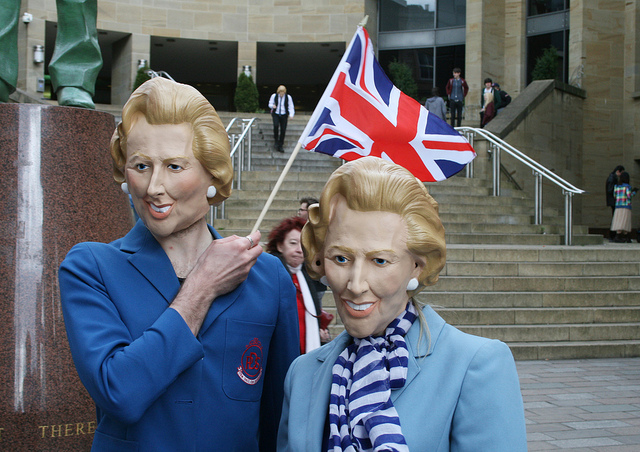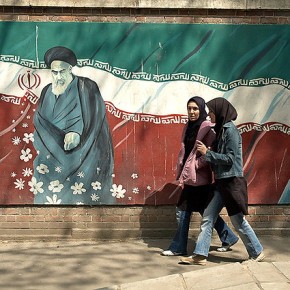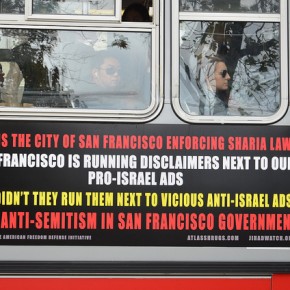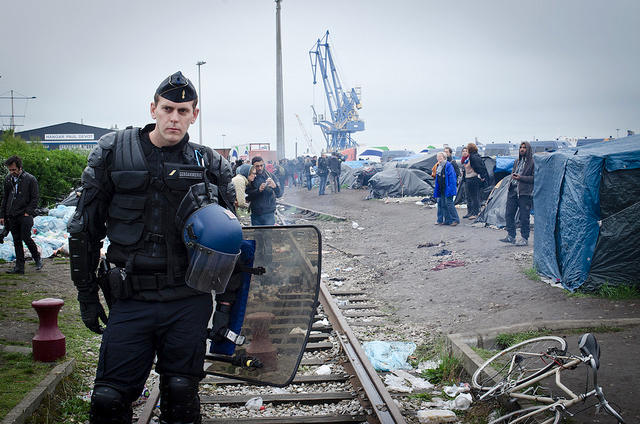Almost everywhere I look, I see condemnations of the celebration of Margaret Thatcher’s death. I haven’t seen many celebrations, but then, at the moment, I am sadly even more miles from George Square than usual. But I will say for certain, I have not seen any jubilation on my Facebook or Twitter feeds. If only things were that simple.
Oh, I have seen all the status updates of “Ding Dong”, “Tramp the Dirt Down” and references to the guillotine that link, conceptually or practically to the angry songs that suggest a party is in the offing.”Ding Dong” (particularly when linked to The Wizard of Oz rather than Klaus Nomi) is troubling for the conjuring of a “witch” rather than a pernicious ideologue and policy maker, but that may be my strongest complaint here. However, I do not see these as gleeful announcements from the present, but reminders of a very angry and very politicised past whose sentiment was felt everywhere.
I do not see celebration in the many posts that recall her ugly actions and statements. This is a woman who gutted a nation from within with privatisation, assaults on the unions, and the institution of a poll tax. She was xenophobic, homophobic, and anti-feminist. She was pro-Apartheid and a good friend to General Augusto Pinochet. She oversaw the ‘shoot-to-kill’ policy in Northern Ireland. And I have only just started.
This is a woman who stands on the absolute wrong side of history, except that so many of the eulogies coming from the mainstream do not seem to think so. President Obama’s delusional tongue-kiss to Maggie called her “one of the great champions of freedom and liberty” and seemed to praise her as a feminist, who had “broken the glass ceiling for other women.” It is a sign of how dire things are, that I happily cite Russell Brand’s response to this, “Only in the sense that all the women beneath her were blinded by falling shards. She is an icon of individualism, not of feminism.”

And yet, there seems to be a contingent who claim that death and a painful dotage spent in isolated dementia exempt Thatcher from our critiques (or, to use the term so beautifully coined by John Oliver and Andy Zaltzman of The Bugle, a ‘Fuckeulogy”). No, as has been observed by Glenn Greenwald, these critical commemorations are needed precisely because they counter the dangerous amnesia that sets in. Death does not wipe the slate clean of horrendous actions nor, sadly, does it remove their effect in the present.
Many of us have seen the retroactive hagiography given to Reagan (whose name graces far too many buildings now) and don’t want to see that again. This certainly explains the presence of Americans who join in the anger: We missed out on our counter-expressions, seeing as the Internet wasn’t what it was back in 2004 at the time of his death. (Although I sometimes wonder, as hideous as his works were, was their legacy as damaging to a nation that has almost always been private and ready to be sold from the start?)
These posts, these angry posts, are doing important work. They summon the material memories of an outraged and engaged past to energise the present. As a friend of mine commented, “It’s only because of the howl of rage/anger/celebration that anything approaching a proper evaluation is now starting to take place.”
And perhaps, so too will the street parties as they will provide physical opportunities for people to gather in solidarity of feeling. These are capacity building occasions, fuelled by a mixture of euphoria and fury— emotions that drive political movements.
Billy Bragg has asked that people not celebrate, but organise. I agree with his charge to become active rather than complacent. Margaret Thatcher’s death does not bring an end to the legacy of her actions felt in the threats to the NHS, the benefits cuts, the rises in school fees, the xenophobic and anti-European measures. But these celebrations also offer us a point for reconnection, with the past, with the present and with each other. Thatcher claimed there was no society. It would be lovely to prove her wrong, and in doing so, to get back down to the business of occupying, everywhere.
Photographs courtesy of TheArches. Published under a Creative Commons license.






Good points. Well made.